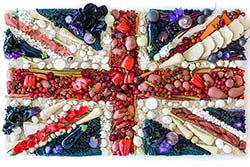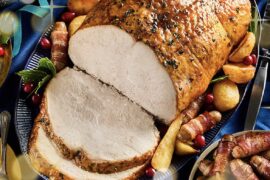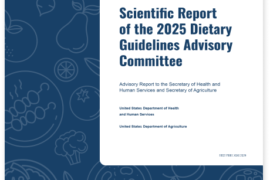Total exports of food and drink from the United Kingdom in 2016 grew by 10.5% to a record high of more than £20 billion in sales, reports the Britain’s Food and Drink Federation (FDF). While the fall in the value of the pound helped to boost export competitiveness, it has also made essential imports more expensive and the UK’s food and drink trade deficit grew by 5.7% to £22.4 billion.
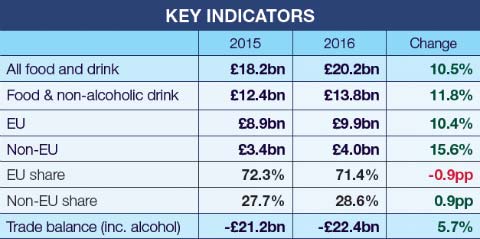
The impact of weaker sterling on British exports is expected to be seen during the first half of 2017 as companies negotiate new sales agreements with overseas buyers, FDF Director General Ian Wright noted during the National Farmers Union Conference in Birmingham on February 21.
Exports of branded food and non-alcoholic drink led the way with growth of 11.5% to £5.2 billion in 2016, marking the 16th year of consecutive growth. There was no breakout of the contribution made by frozen products, however, to the total figure.
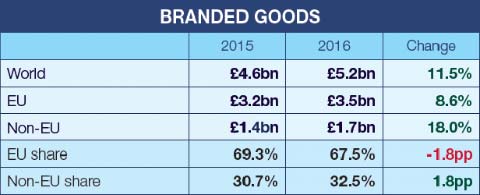
Excluding alcohol, the UK’s three top three export categories remain chocolate, salmon and cheese. Salmon exports advanced 16.4%, driven by large increases to France up 32.2%, Ireland up 24.6% and Germany up 98.9%.
The USA is now the second largest market for the UK food and beverage products, and the largest outside Europe, with exports increasing by 13% to £2.2 billion last year. This now means Britain’s two largest export markets, Ireland and the USA, together account for more than a quarter of all UK food and drink exports. Sales to non-EU markets continued to grow at a faster rate than to the EU, however 71.4% of food and drink excluding alcohol was sold to EU member states.
Demand rose in all of Britain’s top 20 markets in 2016, with China ranking as the fastest growing buying country – up 51.1% on 2015 to £439.5 million. Highlighted as a priority export market in the joint Government-Industry International Action Plan for Food and Drink, China’s appetite for branded UK food and non-alcoholic drink also rose by 50% in 2016 to £84.7 million.
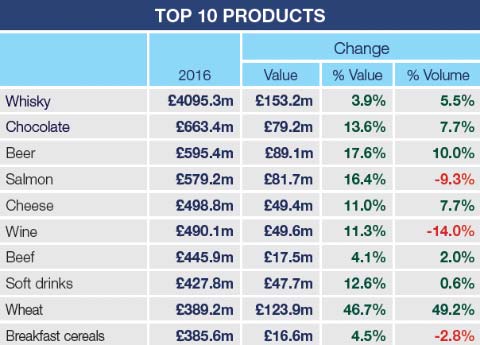
Plenty of Untapped Potential
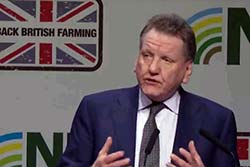 Ian Wright, director general of Food and Drink Federation (FDF), discusses the UK’s record food and drink export figures during the National Farmers Union Conference in Birmingham. FDF Director General Wright commented: “British food and drink exports have hit a record high yet there is still massive untapped potential. More specialist support for new and existing exporters, with fiscal incentives and financial assistance, would get more of the country’s 6,500-plus food and drink producers exporting. Our target is to grow branded exports by a third by 2020 to more than £6 billion.
Ian Wright, director general of Food and Drink Federation (FDF), discusses the UK’s record food and drink export figures during the National Farmers Union Conference in Birmingham. FDF Director General Wright commented: “British food and drink exports have hit a record high yet there is still massive untapped potential. More specialist support for new and existing exporters, with fiscal incentives and financial assistance, would get more of the country’s 6,500-plus food and drink producers exporting. Our target is to grow branded exports by a third by 2020 to more than £6 billion.
“Competing nations such as France, Germany and Italy offer greater support for training, help with start-up costs and showcasing opportunities at international trade show platforms to build their band of exporters. Building on the International Action Plan, we are working with Government and the Food & Drink Exporters Association (FDEA) to help businesses in this sector compete abroad and meet rising demand for British produce.”
FDEA Director Elsa Fairbanks added: “We are pleased to see that the 2016 export figures reflect the positive experiences that the food and drink exporting community continues to share with us. Hopefully even more UK food and drink producers will be inspired to look beyond their home market and take advantage of the huge interest in quality UK food and drink produces and the improved competitiveness of sterling.”

